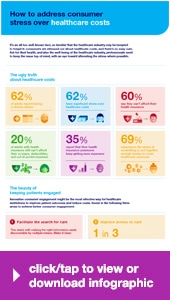It’s an all-too well-known fact, so familiar that the healthcare industry may be tempted to forget it: consumers are stressed-out about healthcare costs, and there’s no easy cure. But for their health, and also the well-being of the healthcare industry, professionals need to keep the issue top of mind, with an eye toward alleviating the stress where possible.
The ugly truth about healthcare costs
 You, as a professional in the healthcare field, may feel well-informed about the cost issues surrounding healthcare. What you really need to feel, however, is what healthcare consumers feel. That requires keeping up with the latest facts and filtering them through an empathetic consumer filter. So, put on your consumer cap, and consider these research findings, from the nonprofit Transamerica Center for Health Studies:
You, as a professional in the healthcare field, may feel well-informed about the cost issues surrounding healthcare. What you really need to feel, however, is what healthcare consumers feel. That requires keeping up with the latest facts and filtering them through an empathetic consumer filter. So, put on your consumer cap, and consider these research findings, from the nonprofit Transamerica Center for Health Studies:
- 62% of adults report having a chronic illness
- 62% also experience significant stress over healthcare costs
- 60% say they can’t afford their health insurance
- 20% of adults with health insurance still can’t afford their co-pays, deductibles, and out-of-pocket expenses, including prescription drugs
- People are unprepared for constantly rising costs – 35% report that their health insurance premiums just keep getting more expensive
- 69% of Americans experience the stress of scrambling to put together enough money to cover healthcare expenses – 35% tap savings, 28% use credit cards, and 6% even have to dip in to their 401K retirement accounts
The concerns, and resulting stress, are real and rising. As a systemic issue, there are no quick or easy answers to escalating healthcare costs – but that does not mean that the healthcare industry can’t lessen the impact on its consumers/patients.
The beauty of keeping patients engaged
Distress over healthcare costs, and the blame laid at the feet of the healthcare and pharmaceutical industries, might suggest an intractably adversarial divide that can only make consumer stress even worse. Nonetheless, a recent report from Deloitte suggests that the most effective way to improve patient outcomes (which stress can negatively impact), and reduce costs may be for healthcare institutions to actively close that divide through innovative consumer engagement.
As the report states, “Consumer engagement with healthcare continues to grow, from searching for care and accessing new channels of care to tracking and sharing health data.” It recommends that healthcare providers invest in three particular areas to achieve better consumer engagement and the resulting sense of empowerment that can cut down on stress.
1. Facilitate the search for care
The research shows that finding the right healthcare professionals is a matter of great concern – and therefore a great opportunity to improve consumer/patient engagement and experience. This starts with making the right information easily discoverable by multiple means (traditional and digital communications). Make it clear:
a. Which health insurance networks apply
b. What locations are available (consumers want convenience)
c. What your reputation is (patients look for positive rankings on personality and bedside manner)
According to the report, these factors are more important to decision making by healthcare consumers than claims of technological superiority.
2. Improve access to care
While available technology is not the leading factor in selecting healthcare, it is increasingly a boon to using it effectively. About one-third of consumers are now willing to use apps and other digital tools for everything from symptom diagnosis to remote consultation and personal health coaching. There is an even greater willingness among younger generations, suggesting an increased role for digital access and engagement in the future.
3. Help consumers track and share health information
While general concerns over data privacy have increased, healthcare consumers express a willingness to share their health data with providers, in the hope of both improved health and lowered costs. Sixty percent say they would be willing to share data from wearable devices, the use of which was shown to be significantly on the rise.
Will engaging consumers in these ways resolve the crisis in healthcare costs? No, of course not. But it can have a significant impact on consumer stress. As the Deloitte report concludes, “Consumer engagement could be the key to improving patient outcomes and reducing health care costs; patients who are informed…and involved in their treatment decisions tend to have better health outcomes and typically incur lower costs.”
Sources:
Health Finance News: American’s stressing out over soaring healthcare costs
Deloitte: Inside the Patient Journey … Consumer Engagement
